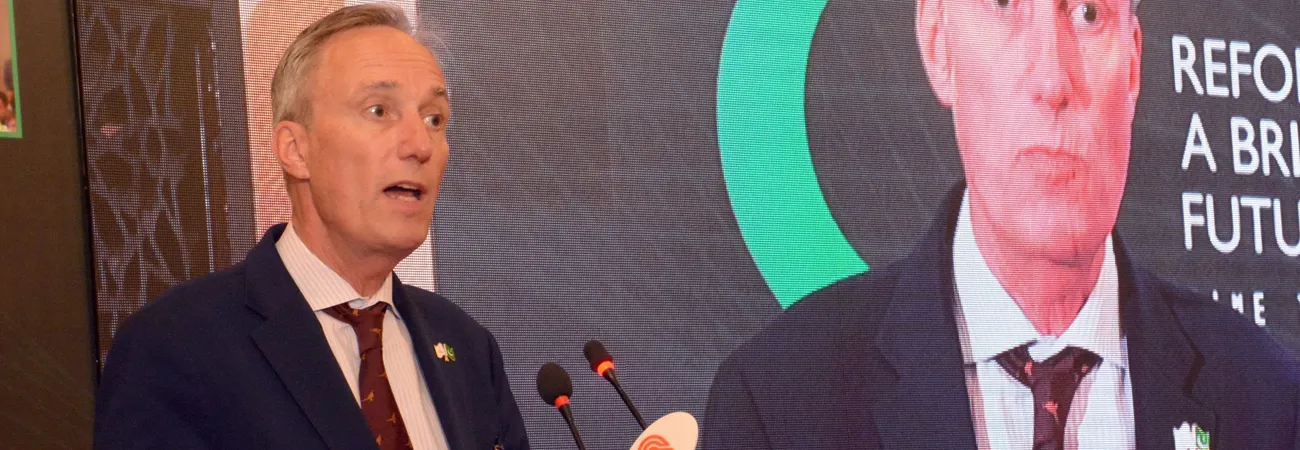i NEWS PAKISTAN
All Pakistan Business Forum (APBF) has said that the economy is stuck in low growth trap with poor human development outcome and increasing poverty, as economic conditions leave Pakistan highly vulnerable to climate shocks with insufficient public resources to finance development and that international experience suggests that domestic debt re-profiling did not always work unless associated with sharp and sustained structural reforms identified over four decades ago but remain pending to this day. Referring to a report, APBF President Syed Maaz Mahmood observed that business community has long been urging the government to reform the power sector, since decades ago when circular debt was
in millions of rupees which today was a whopping 2.5 trillion rupees, to reform the tax structure that continues to rely heavily on indirect taxes whose incidence on the poor was greater than on the rich, a major contributory factor in poverty levels reaching a high of 40 percent today, to continuing the policy of steadily raising the budgeted current expenditure, thereby shrinking the available fiscal space annually and, last but not least, warning the government of an impending water scarcity decades ago that went unheeded resulting in the country’s current status of a water-stressed country.
Maaz Mahmood advised the government to look at the bigger picture while cautioning domestic stakeholders that creation of a new institution that envisages billions of dollars of investment inflows backed by pledges may not provide a quick fix of the economy. This was not to undermine the concerted ongoing efforts to make Pakistan an attractive destination for foreign investment but to emphasize the fact that basic economic theory dictates that foreign investment would flow into those countries where the economy was strong, growth was projected to rise and key macroeconomic fundamentals, including foreign exchange reserves, were more than sufficient to forestall the possibility of inability to meet the import bill, which include basic inputs/essentials for industry as well as the householder.
The APBF President said that structural reforms are therefore the way forward and until and unless the administration supplements its crackdown with these reforms that are minutely identified in reports but
continue gathering dust in all relevant ministries, the situation is unlikely to lead to sustainable long- term improvement. He said that the government was forced to borrow from the domestic and external resources to finance the fiscal deficit as the country’s tax revenue collection was insufficient to meet the expenditures. While, in absence of external financing the government was completely dependent on domestic borrowing, of which domestic debt stocks were sharply increasing.
Multilaterals as well as bilateral have long been urging the government of Pakistan to reform the power sector, since decades ago when circular debt was in millions of rupees which today was a whopping 2.5 trillion rupees, to reform the tax structure that continues to rely heavily on indirect taxes whose incidence on the poor was greater than on the rich, a major contributory factor in poverty levels reaching a high of 40 percent today, to continuing the policy of steadily raising the budgeted current expenditure, thereby shrinking the available fiscal space annually and, last but not least, warning Pakistan of an impending water scarcity decades ago that went unheeded resulting in the country’s current status of a water-stressed country.
Maaz Mahmood noted some home truths about the steady regression of key macroeconomic indicators due to resistance and reluctance to implement the necessary reforms by civilian and military dispensations that, in his words, accounts for the worst ever economic crisis in the country today. He referred to the stop and go cycles of half-hearted reforms that were just enough for the country to muddle through but that offer no long term perspective of improvement. There was no doubt that post- 7 September 2023, the crackdown against multiple market players - the speculators in the foreign exchange market, consumers engaged in electricity theft and smugglers of essential commodities, including wheat and sugar, operating for decades across our large porous borders - has yielded significantly positive results. However, the gains allow the country to muddle through, and as stated by him, offer no long-term prospects of improvement.
Credit: Independent News Pakistan (INP)









